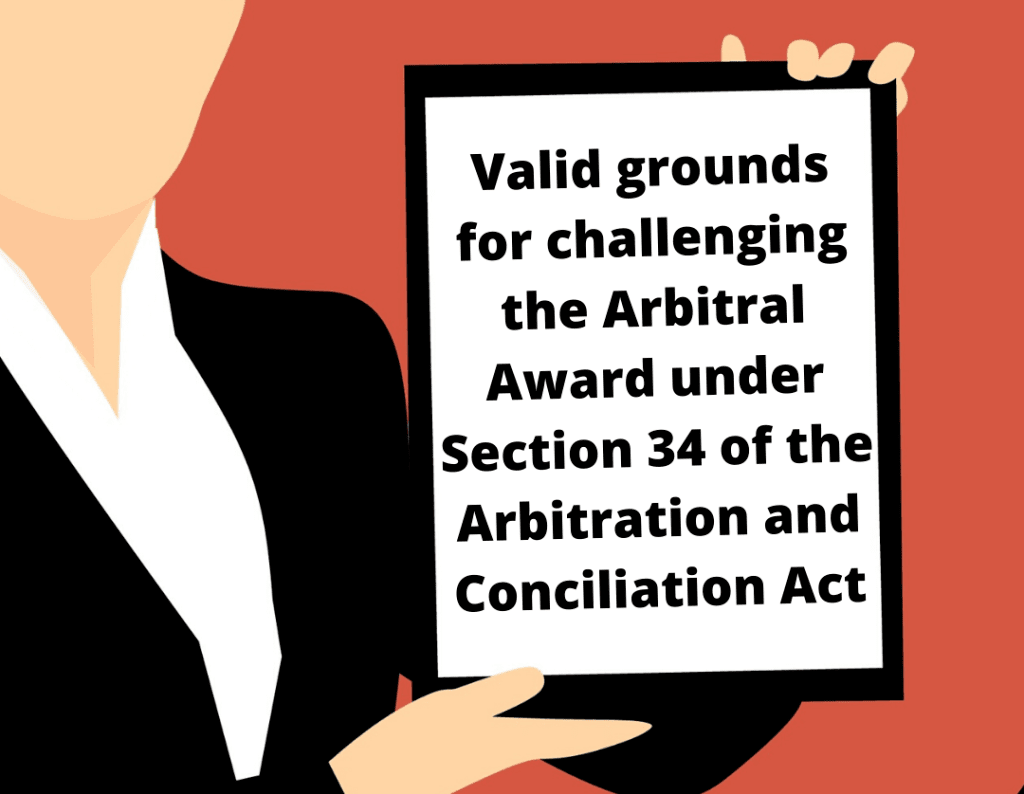Latest News
Grounds for Challenging an Arbitral Award under Section 34 of the Arbitration and Conciliation Act, 1996

To enable the constructive adaptation of Alternative Disputes Resolutions (ADR) in India, the Arbitration and Conciliation Act, 1996 was passed. These contain independent provisions to monitor such dispute resolutions which are beneficial to the parties, the Judiciary and the Government. One such provision is under Section 34 where if parties want to set aside the Arbitral Award, they can do so under restricted circumstances allowing the authenticity of such mechanisms to subsist.
It is evident that the prime purpose of ADRs is to reduce the burden of the courts, provide more approachable and cost effective mechanisms for parties to solve their disputes. Thus to ensure that awards are binding and not just a process to stall legal proceedings, minimum interference of court in guaranteed. Section 34 read with section 37 provides that an arbitral award can be challenged only on limited question of law and fact.
Under Section 34, the grounds under which an application for setting aside an award are:
- A party to the agreement was not in proper capacity
- When the arbitration agreement was not a valid one
- The party making the application was not given proper notice of the appointment of an arbitrator or of the arbitral proceedings
- If the dispute is beyond the scope of the agreement
- The composition of the arbitral tribunal or procedure was not in accordance to the agreement of the disputing parties
- If the dispute is not capable of settlement by arbitration
- The award was in conflict to the public policy of India
Such an application should be made within 3 months from the declaration of the award, an extension of 1 month may be given in case the court trusts there is sufficient cause of delay. Such applications are not easily accepted the court. P Radha Bai v Ashok Kumar,[1]the court held that the phrase “but not thereafter” in Section 34(4) of the Act nails the legislative intent of giving “finality” to the Arbitral Award by fixing an “outer boundary period” for challenging an award.
The High Court referred to Associate Builders v. DDA,[2]wherein the Supreme Court cautioned that under Section 34, the courts should not set aside arbitral award merely because they do not agree with interpretation of the agreement given by the arbitrator, rather it has to be shown that tribunal’s findings were based on no evidence or irrelevant evidence or was perverse.
In the Amendment Act, a new explainaion was added to Section 34 for pubic policy. In the case of Ssangyong V. NHAI[3]the scope of public policy was defined within three broad categories namely (1) fundamental policy of India law wherein there is a contravention of a law protecting national interest; disregarding orders of superior courts in India; principles of natural justice such as audi alteram partem (2) the award was against basic notions of morality or justice and (3) patent illegality like where the award was not based on evidence, arbitrator took views beyond the scope of the agreement etc.
The Supreme Court in Kinnari Mullick and Another vs. Ghanshyam Das Damani,[4]held that the court has no jurisdiction to remand the matter to the Arbitrator for a fresh decision while deciding a Section 34 petition. Further, it was held that the discretion of the Court under Section 34(4) to defer the proceedings for specified purpose is limited and can be invoked only upon request by the party prior to setting aside of the Award.
Thus it is clear that the court is usually reluctant to accept applications to set aside Arbitral Awards under Section 34. The legislative intent would be lost if they did accepted applications without good reason like jurisdiction, failure to comply with procedure or where the arbitral tribunal made mistake of law or fact. Stringent as they may, it helps to maintain the significance of Arbitration as an alternative dispute resolution mechanism.
[1]P Radha Bai v Ashok Kuma, 2018 SCC1670.
[2]Associate Builders v. DDA, (2015) 3 SCC 49.
[3]Ssangyong Engineering & Construction Co. Ltd. v. National Highways Authority of India, Civil Appeal No. 4779 OF 2019.
[4]Kinnari Mullick and Another vs. Ghanshyam Das Damani, (2018) 11 SCC 328.



































































































